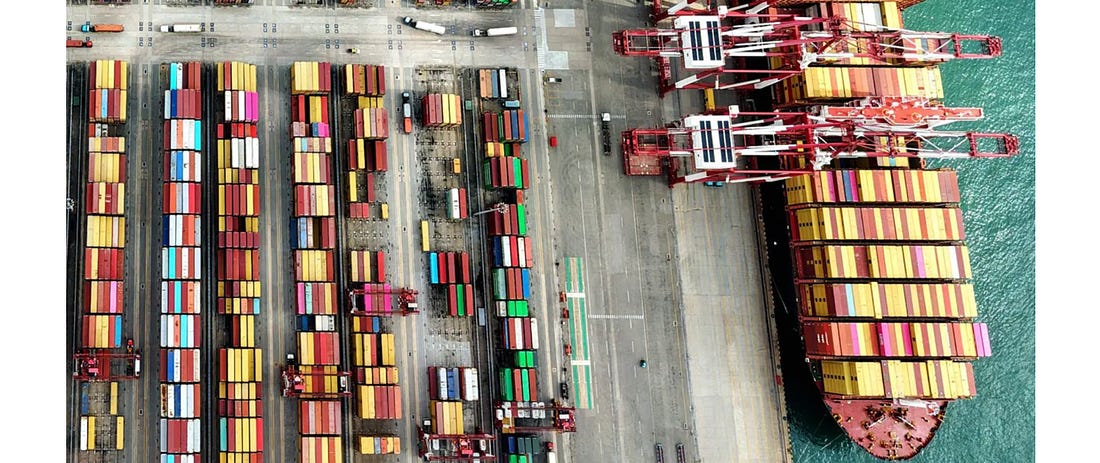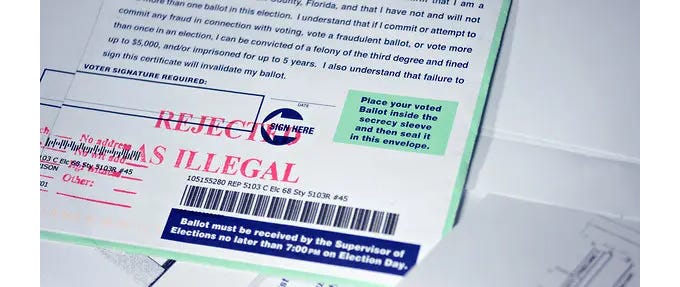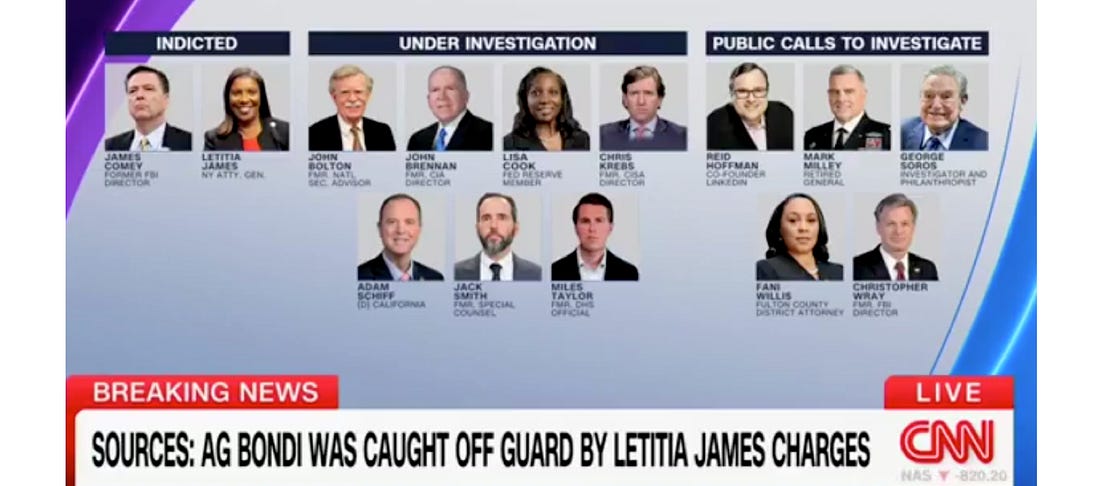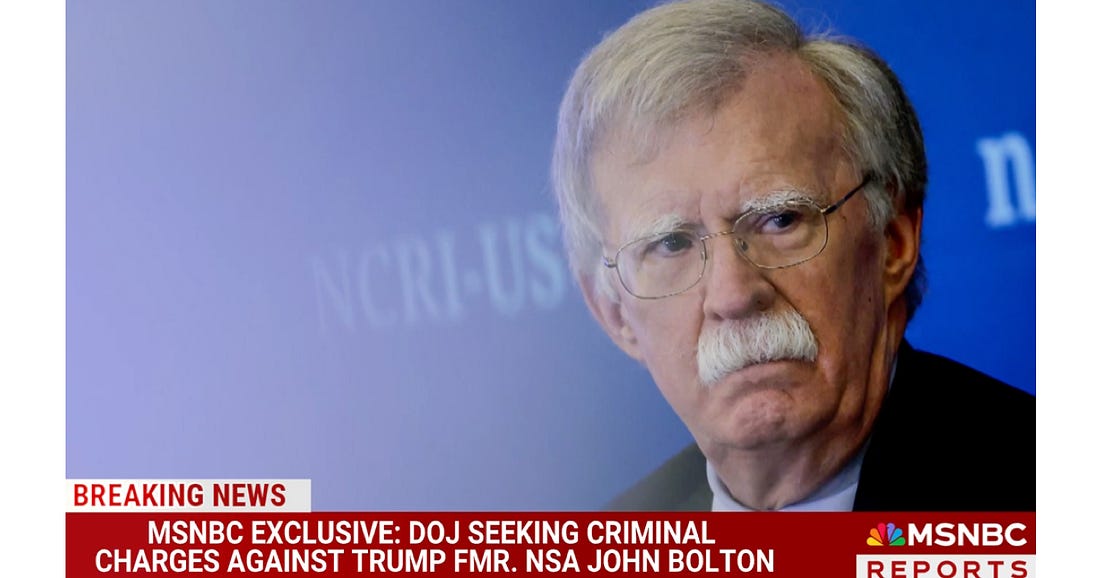C&C. Chem Trails. More China Tariffs. Election Challenges. Bolton? Ivermectin Shines Again.
October 11 | Posted by mrossol | Childers, Democrat Party, Election Issues, Fraud, Law, Medicine, TrumpFlorida’s anti-chemtrail law grounds “nonexistent” planes; Trump reignites tariff war with Chyna; SCOTUS eyes 2020 fix; Bolton roasts; CNN flails; NYT baffles; ivermectin shines in cancer study.
Source: DIZZYING DICHOTOMIES ☙ Saturday, October 11, 2025 ☙ C&C NEWS
WORLD NEWS AND COMMENTARY
✈️✈️✈️
This week, the Palm Beach Post ran an unintentionally terrific story headlined, “Florida airports start reporting banned ‘weather modification’ aircraft per chemtrails ban.” Don’t drag that stuff down here.
Florida’s new anti-chemtrail law took effect on July 1st, and it is driving the media straight off the cliffs of insanity. Actually called the “Clear Skies” law, but media compulsively calls it the “chemtrails ban.”And in an alarming, terets-like way, whenever it’s mentioned, they obsessively recite several detailed paragraphs explaining how “chemtrails” are in fact just harmless ice crystals formed from harmless water vapor in harmless jet exhaust, as though we haven’t already heard that implausible excuse a hundred million times already. At least.
The word “conspiracy” appears eight times in the Post’s brief article. Of course.
It seems to me that the skies have been much clearer since Florida’s Chemtrails Ban took effect. I can’t recall a single day since when the sky was crisscrossed with lines. Nor any weird “smear” clouds. Just my personal observation, for whatever that’s worth. And, for the first time in ten years, no hurricane hit land in Florida during the month of September. I’m just saying, but that happy coincidence reflects badly on corporate media’s chemtrails deniers.
Anyway, the “news” was that the reporting requirement kicked in on October 1st. So far, two airports in Florida have filed formal notices with the FAA “closing” their landing strips to “geoengineering and weather modification aircraft” absent prior permission. Prior permission, assuming it is ever requested, allows the airport to snitch on all geoengineering planes to the State of Florida.
The media reporting on this developing story is nearly psychotic. The thing that isn’t happening keeps making news. They keep explaining their ice crystals theory, over and over, but everyone —readers, lawmakers, airport personnel— keeps ignoring them.
🔥🔥🔥
The short reprieve from tariff news ended yesterday as CNN ran a hyperventilating story headlined, “Trump announces 130% tariffs on China. The global trade war just came roaring back.”
Big Trouble in Little China resumed this week after the Asian Giant announced new export restrictions on “rare earths,” which has to be one of the dumbest names going. The phrase “rare earths” refers to things that are commonplace (not rare), are not dirt, and are often manufactured (not buried in the ground), like strong magnets. In short, “rare earths” are things made from minerals grouped as “rare earths” on the periodic table of elements, which is a confusing science chart despised by most American middle schoolers, but (for some reason) loved by nerdy chemistry majors who wear it on t-shirts and think it’s funny.
The problem with China’s new policy is that, due to globalists’ shortsighted economic policy, only China makes the good magnets now, and the magnets are needed to make lots of other, more interesting manufactured products, like bumper stick-ons saying “My Driving Scares Me Too,” and especially bombs and missiles. Yesterday, President Trump learned that China had stingily ordered countries to which it sells “rare earth” magnets not to let the U.S. have any.
President Trump was not amused.
“The United States of America will impose a Tariff of 100% on China, over and above any Tariff that they are currently paying,” Trump threatened on Truth Social yesterday afternoon. “Also on November 1st, we will impose Export Controls on any and all critical software.” Trump also abruptly canceled his next face-to-face meeting with China’s President Xi, foreclosing the possibility of attending a lavish, all-you-can-eat Asian buffet.
Anyway, the media largely focused on the horrifying effects the “trade war” might have on the stock market since, when they aren’t writing biased and misleading articles, reporters have relapsed into day trading again (not having learned their lesson from last time), without giving a single sympathetic thought to how this rare-earth situation affects people who wear green sweatshirts.
Remember Ukraine and that whole Proxy War thing?
China’s embargo on “rare earths” mostly affects military manufacturing, which translates from the Chinese vernacular to even more probrems for Ukraine, which is where most of the West’s defense production is currently being Fedexed as soon as it rolls off production lines. Ukraine, currently struggling to hang on, will soon face even more shortages of critical refrigerator magnets and whimsical levitating light bulbs. And air defense missiles, of course.
For example, headline from the BBC, last night:
“What’s needed is not empty words but decisive action – from the United States, Europe and the G7 – in delivering air defence systems,” Ukrainian President Volodymyr Zelensky tweeted yesterday from a dark office using a battery backup.
But what’s needed are not empty words; it’s decisively magnets. Without China’s magnets, it will be difficult to provide Ukraine with those air defense systems. So.
⚖️⚖️⚖️
This week, as the Supreme Court continued hearing oral arguments, election integrity hardened again. On Wednesday, ABC ran a terrific story headlined, “Supreme Court likely to let candidates more freely challenge state election laws.”
Anyone who was not high on drugs during the stolen 2020 election cycle will recall case after case being tossed out by courts that summarily found the challengers lacked standing to dispute the votes, regardless of how many examples of fraud or how many affidavits from poll watchers they’d produced. Indeed, of the handful of cases where courts granted standing and considered evidence, the vast majority were decided in Trump’s favor.
The reason this insanely frustrating situation happened is that the current rule for establishing standing to dispute an election is extremely demanding. Candidates (not voters) must show that a particular problem is so widespread and so severe that it materially affected the election outcome— under a brutal ten-day deadline to assemble evidence.
Consider a hypothetical. In August, with months to go before the November election, Penciltucky’s local supervisor Karen Looney makes a critical rule change and announces voters can send in their votes telepathically. The Republican candidate Abe Justice sues— but the judge dismisses it, saying Abe can’t show that psychic voting would hurt his election. He must wait to see if he loses. Then, and only then, he’ll get ten days to figure out what happened, put his case together, assemble evidence, and file suit.
These rules cram candidates into an impossibly tiny box. If they file too soon, they get thrown out. If they file too late, they get thrown out. They get one brief window of ten days to mount an entire case— and that’s it. That is one reason why the 2020 election litigation was such a disaster: the rules gave liberal judges a million ways to quickly broom away the politically toxic cases.
The controversy that arrived at the Court yesterday was a perfect setup. The candidate, Michael Bost, is a Republican in a safe House seat. He challenged a new Illinois law allowing tardy mail-in ballots to be counted up to two weeks after election day. Critically, he freely admitted that in his conservative district, late-counted ballots would probably not prevent his election. It would just make things harder.
In other words, it was filed as a strategic lawsuit meant for the Supreme Court.
Unexpectedly, the lower courts all found Representative Bost lacked standing to challenge the Illinois law, since he couldn’t prove he would be harmed. First, he was too early: the election hadn’t happened yet. Second, he admitted that he’d probably win anyway, so he had no hope of proving the post-election-counting law would have any material effect on the outcome.
The only actual harm Bost could identify was that he’d have to hire poll watchers to monitor two weeks of late counting.
Most court watchers concluded from the Justices’ questions at yesterday’s oral arguments that all the conservatives and maybe even one of the liberals were ready to change the standing requirement to make it easier for candidates to bring cases, and to let them bring their cases well before an election, such as at the time a local election supervisor changes a rule or a state passes a new law.
Also, the majority of justices seemed to accept that, not only would it be much more efficient to let candidates raise pre-election challenges, but they also seemed ready to relax the “material effect” rule requiring challengers to show they were likely to lose. Justice Kagan, one of the court’s liberals, even proposed a new standard where even a winning candidate would only need to show he was at a disadvantage, even if the disadvantage was only “a diminished margin of victory,” or even just higher costs to run the campaign.
The Justices even seemed to back off from the current high evidentiary standard. “I’m sort of in sympathy with the view that this bar should not be all that high,” Justice Kagan said. “You shouldn’t have to say: Here are the polls that show I could lose as a result of this rule.”
If, as seems likely, the Supremes fundamentally change the rules of standing, it will open the courthouse doors for conservatives to immediately tackle laws facilitating fraud, like those related to mail-in ballots. The timing of a decision next year —still months before the 2026 midterms and two years before the next presidential cycle— is beyond fortuitous.
The single change of not requiring candidates to wait for results before challenging election laws could fix nearly everything that went wrong with the 2020 elections. Stand by.
🔥🔥🔥
Take a look at this remarkable CNN segment. It rounded up every Biden Administration ne’er-do-well who is either currently indicted, under investigation, or in the crosshairs:
At least one of those scallywags is about to shift columns. Yesterday, MSNBC ran a terrific story headlined, “Criminal charges against John Bolton expected as early as next week.” It can’t possibly come fast enough.
MSNBC’s sources reported that a Maryland grand jury has been hearing “several weeks” of evidence against former National Security Director and Russiagate conspirator John Bolton. That’s a lot of evidence. “But the pace of the case has recently sped up,” MSNBC’s sources said.
When Bolton is indicted next week, he’ll be the third deep state mole to be charged. Expect corporate media “revenge” hysteria to accelerate also. But, MSNBC admitted, “Unlike the widespread resistance career prosecutors in Virginia have shown to Trump’s pressure campaign to charge former FBI Director James Comey and New York Attorney General Letitia James, career prosecutors in Maryland consider charges against Bolton to have some factual merit.”
In other words, the case against Bolton is even stronger than the Comey and James cases.
🔥 You may recall that three weeks ago, the FBI raided Bolton’s home and office. From what little we know, there are two potential possible charges. First, even Bolton’s attorney has admitted the deep state termite had unauthorized classified documents. Bolton’s lawyer only claims they were “old” and “typical of those kept by a long-time government employee.”
As I recall, legal pundits widely rejected that very defense in the Trump classified documents case. Classified documents are classified for a reason,pundits argued.
Second, and even more intriguing, a redacted part of the search warrant was titled, “Hack of Bolton’s AOL Account by Foreign Entity.” The sources said the hack was discovered during a “sensitive foreign intelligence operation.”
The article didn’t speculate, but this title alone suggests the relic Bolton may have been using his ancient AOL account for government purposes. Bolton should never have had any classified or sensitive information in an AOL account. Federal security protocols strictly prohibit storing, transmitting, or discussing classified material through personal, unsecured email services like AOL. Duh.
If true, if Bolton compromised national secrets by sending them on an unsecured AOL account that got hacked by foreign spies, it would explain why the grand jury presentation required several weeks. And, if true, he’s not likely to ooze out of this one.
MSNBC’s anonymous sources complained that revealing Bolton’s misuse damages US national security, since foreign governments now realize we can see into their systems. But more importantly, they didn’t say Bolton was innocent; it’s just an argument about the trade-off.
🔥 All of which led to a funnybone-tickling headline splashing the top of this morning’s New York Times:
The Times found a “dizzying dichotomy” of “presidential personas” between President Trump’s global peacemaking and “a seemingly never-ending series of conflicts at home.” The Times pretended to be confused by scenes from jubilant Israelis and Palestinians on the one hand, versus ICE-Antifa clashes in Portland on the other. The Grey Lady helpfully provided a splitscreen:
White House spokeslady Anna Kelly explained it. “President Trump is working to end conflicts around the world, just like he is also working to quell violence in cities across the country,” she said simply.
The Times rounded up a long list of domestic complaints, like Letitia James’s “unfair” indictment for mortgage fraud, Trump meanly calling Governor Pritzker a “slob,” and dispatching the National Guard to Chicago.
I’ll give the Times credit for one thing, though. This article —which was nothing more than an op-ed dressed up as news— surprisingly quoted both sides. The story included reactions from Anna Kelly, Dr. Oz, and two conservative groups, the Article III Project and the Cato Institute. Opposing them were just the reporter and a random Princeton history professor who thinks Trump “can’t resist going after his perceived enemies.”
It is far too early to conclude there’s been any change in journalistic standards at the Times, a development so unlikely I’d expect Comet 3i/Atlas to squash Ben & Jerry’s corporate headquarters first. But despite the headline and the reporter’s sneering tone, the article was surprisingly positive for President Trump.t n
🔬🔬🔬
Another ivermectin study is out, and like the long list of similar studies lately, it shows more cancer treatment potential. This one was published in July in ACS Biomaterials Science, titled, “Intranasal Delivery of Ivermectin Nanosystems as an Antitumor Agent: Focusing on Glioma Suppression.”
In short, the study found low-dose ivermectin shrank brain tumors by a whopping 70% in rats. The treated rodents also had less dead tissue, less swelling, and fewer new blood vessels forming, which means the remaining tumors were less invasive and less aggressive.
The ivermectin was delivered using a nasal spray in a very fine (nanoscale) form, since oral ivermectin can’t cross the blood-brain barrier. The rats that got the treatment showed no negative side effects.
The serendipitous discovery of ivermectin is one of the most remarkable stories in medical science. In the 1970s, Japanese microbiologist Satoshi Ōmura set out to find new microorganisms that might produce useful medicines. He collected hundreds of soil samples from around Japan, including one from a golf course in Kawana, south of Tokyo.
In one of his golf-course soil samples, Ōmura’s team isolated a previously unknown bacterium that produced compounds found to be extraordinarily effective at killing parasitic worms. He sent it to a U.S. lab at Merck, which developed ivermectin: a safer and even more potent chemical derivative of the bacterial compound.
As you know, in 2015, Ōmura and Merck researcher Bill Campbell jointly received the Nobel Prize in Medicine for a cheap dirt drug that has saved millions from disease and blindness. If ivermectin’s cancer-fighting abilities bear out —and the studies and anecdotes keep mounting up— it will become the single most beneficial accidental discovery in human history.
Here’s a question to ponder: would ivermectin have broken out of the pharma wilderness absent its high-profile role during the pandemic as a cultural and political flashpoint? Without this extraordinary exposure, efforts to study ivermectin as a cancer agent would almost certainly have remained niche— buried in the literature amid hundreds of other “drug repurposing” efforts, lacking funding, conference time, or media coverage.
Ivermectin may wind up being the greatest covid miracle of all.
Have a wonderful weekend! C&C will be back right here on Monday morning, with a whole new intranasal delivery of essential news and colorful commentary.
Don’t race off! We cannot do it alone. Consider joining up with C&C to help move the nation’s needle and change minds. I could sure use your help getting the truth out and spreading optimism and hope, if you can:☕ Learn How to Get Involved 🦠














Leave a Reply
You must be logged in to post a comment.